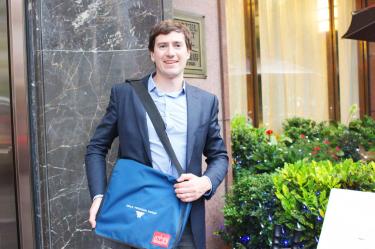The Human Rights Foundation is seeking to hold one of its freedom forums in Taipei next year to highlight Taiwan’s suppression in the international community and its democratic achievements, the New York-based group said.
The forum usually brings the experience of the foundation’s flagship annual conference — the Oslo Freedom Forum — to different regions of the world to discuss human rights, political freedom and democracy issues.
As the foundation is seeking to bring the forum to East Asia, Taipei is the host city of choice, chief strategy officer Alex Gladstein said in an interview in Taipei on Wednesday.
The aim is to inform activists around the world about Taiwan’s transition to democracy, which is an example of democracy in a Chinese society, said Gladstein, who is in Taipei to plan for the forum.
He said Taiwan serves as a good example to the government of China, demonstrating that democracy is possible for Chinese nations.
Gladstein said that China has been crushing Taiwan internationally and can outdo the nation in many areas, from economy and investment, to food and culture.
“But the one area where Taiwan will always beat China, at least at the moment, is human rights and democracy,” Gladstein said.
Yang Jianli (楊建利), a US-based Chinese democracy advocate and former political prisoner, backs the foundation’s plan for a forum in Taipei.
“Taiwan is a democratic country, but it has little international visibility, as Taiwan is not a member of the UN or many other international organizations in which China has membership,” said Yang, who is also visiting Taipei.
China often squeezes Taiwan’s international space and it is unfair that there is no representation of Taiwan’s 23 million people in the UN system, he said.
The international forum would provide an opportunity for Taiwan to gain greater international visibility, Yang said.
The forum, which has been held in Europe, North America and Latin America, will next year focus on political freedom, democracy issues and a growing problem of dictatorship around the world, Gladstein said.
About 2.8 billion people in the world live in one-party states, including China, where independent journalism and independent activism are illegal, he said.
In China, people are prosecuted if they openly disagree with the government, Gladstein said.
“The status quo in China is not acceptable,” he said.
One of the goals of the forum will be to expose the problems in China in hopes of promoting greater awareness and encouraging people to help, Gladstein said.
Assistance to activists in China does not have to be in the form of financial resources, he said.
For example, software that allows activists there to contact each other safely would be of great help, he said.
The Human Rights Foundation is a non-profit organization that aims to promote and protect human rights globally. Its programs mainly support activists and civil society leaders working in tough environments like Cuba, China, North Korea and Saudi Arabia.
Since 2009, the foundation has been holding the annual Oslo Freedom Forum in Norway, bringing together dissidents and leaders from the business, technology, media and political sectors to discuss ways of promoting human rights and democracy.
Source: Taipei Times - 2016/08/13





















